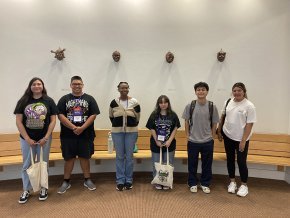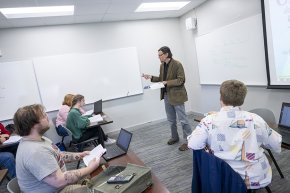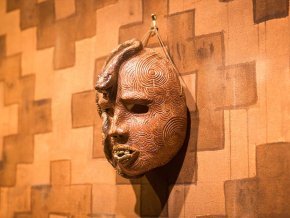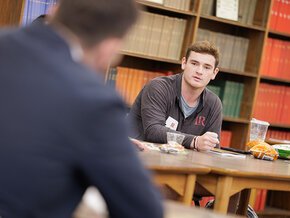
Connecting through culture and inquiry
While November marks Native American Heritage Month nationwide, learning from Indigenous cultures in western North Carolina extends throughout the year. At Lenoir-Rhyne University, students explore these rich traditions as part of a broader commitment to asking deeper questions, considering what it means to live thoughtfully and responsibly in the world.

In September, a group of students from several philosophy courses, including First Year Experience (FYE), joined Michael Deckard, Ph.D., professor and program coordinator of philosophy, for the 15th annual “Rooted in the Mountains” symposium at Western Carolina University. Centered on the theme “Matrilineal Worldmaking,” the event highlighted Indigenous women’s knowledge, leadership and cultural narratives — inviting participants to explore alternative ways of understanding family, community and power that have resonated within their coursework and worldviews.
“It’s important to think about the utility of what we’re studying and how it applies to our career goals, but college is also about life experience,” said visual arts major Amaranth Edwards ’29. “Taking advantage of opportunities to interact with different people and hear different voices — it’s the difference between reading an article about something and hearing the stories of someone’s lived experience in person. If you limit yourself to your own experience, you’re setting yourself up to fail. We’re here in college to test and go beyond those limits, to set ourselves up to succeed not just in jobs but in life.”
Learning from Indigenous perspectives
Deckard’s research focuses on elevating Indigenous voices in philosophy and religious studies — perspectives often missing from traditional surveys. The symposium gave him a chance to share this approach with students firsthand. “So much of the history we study leaves out Indigenous peoples’ ideas and experiences,” he said. “Giving students direct access to these stories helps them see philosophy not just as abstract thought, but as a living conversation about culture, identity and community.”

Students engaged in morning storytelling sessions, afternoon discussions on motherhood and community, and an evening program connecting astronomy with Indigenous history. They observed the alignment of constellations with ancient earthworks, and witnessed how landscapes were intentionally structured in relation to celestial events.
“I grew up in the Eastern Band Cherokee Nation and have been part of that world all my life, but I learned so many things I didn’t know,” said LittleHawk Reed ’29.
Reed explained how matrilineal society emphasizes interdependence. “The people know themselves, and they value honesty and responsibility, community, family and friends. You do things for others that they can’t do, and vice versa. Power in this society comes from what you can do for each other and the connections you build, not from individual wealth or material gain. Strong relationships connect us to more knowledge and ability, so it builds on itself.”
Finding meaning in connection
Other participants shared a range of takeaways from the symposium. Summer Gallagher ’28, a psychology major, said, “Seeing this range of perspectives helped me clarify my goals and outlook for my own life. To see the lives and purpose of women in society going beyond reproduction and motherhood — what some people might consider the main role — that was really eye-opening for me personally.”
Criminal justice major Rudy Hernandez ’25 added, “Knowing the history and culture of Indigenous peoples, understanding their traditions and seeing that they are striving for recognition is part of establishing connections between cultures and building a more peaceful, productive society overall.”
For Kyree Bigwitch ’28, a nursing major and member of the Eastern Band Cherokee Nation, the event reinforced her professional aspirations. “Hearing these women and mothers talk reminded me why I want to work in sonography — supporting mothers and babies is something my culture values.”

Education as a way of being
Bigwitch also drew inspiration from her friend and LR alumna Tishara Sneed ’25, who is now pursuing an MFA at Western Carolina. Sneed’s artwork is rooted in her Cherokee heritage. “Seeing Tishara’s work reminds me how our culture lives through creativity and storytelling,” Bigwitch said. Her mother, also an artist and activist, has encouraged her to take an art class this semester to learn embroidery and other craft techniques. “It’s not my career goal, but artistic expression motivates me. It’s a way for culture, care and creation to intersect and make meaning.”
The belief that learning extends beyond the classroom and shapes who we become is at the heart of Lenoir-Rhyne’s mission to cultivate the whole person. As Deckard put it, “When our students encounter Indigenous knowledge and perspectives, they’re not just learning about another culture — they’re discovering new ways of being in the world and new possibilities for living well together.”
News & Events

The milestone reflects strong alumni and donor support as Lenoir-Rhyne advances student-centered priorities and future campus investments.
View More
Spring 2026 events feature a conversation on “On Tyranny,” a Mardi Gras concert highlighting American composers and a panel discussion about what binds a nation.
View More